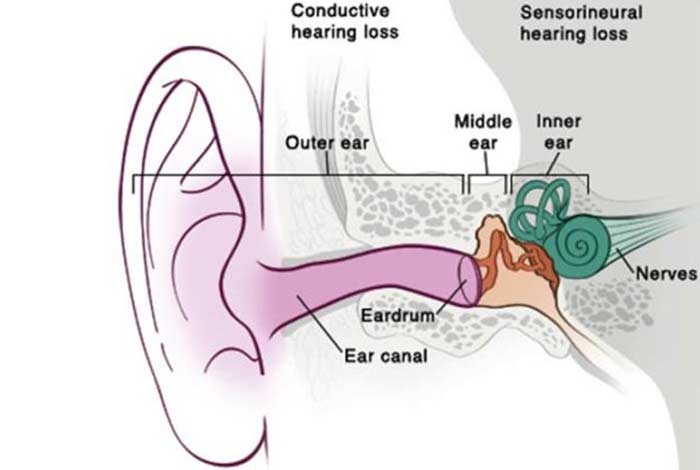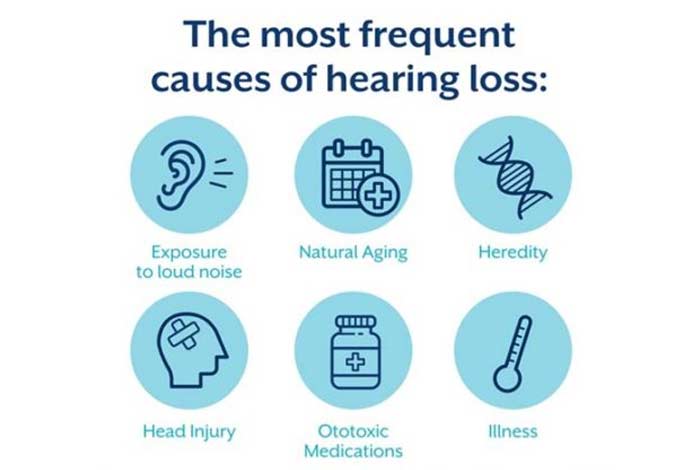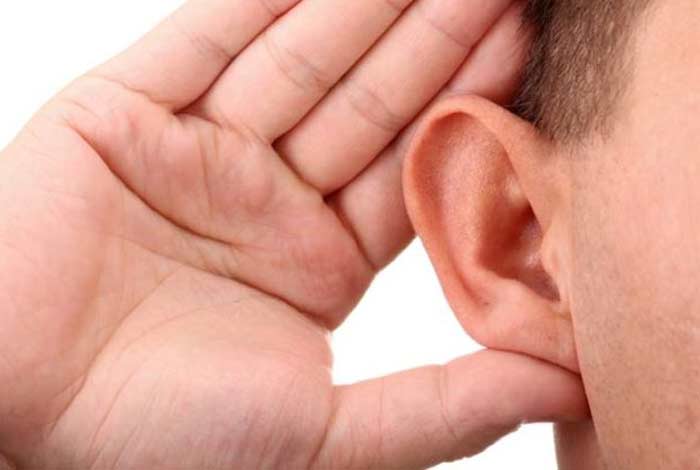
Overview and Facts
Ears are the gifts nature has given us to put jazz in our lives. These are the auditory boxes in our bodies and help us in communicating with our environment. Ears also help in maintaining the balance of our bodyTypes. However, hearing loss can deprive you of the wonders of sound.
Hearing is a process that begins in the external ear, called pinna which funnels sound waves into the ear canal and vibrates the eardrum. The vibrating ear membrane then vibrates the bones of middle ear, namely malleus, incus and stapes. These bones vibrate and transfer the vibrations to the fluid and membranes of the inner ear. It is here that sound recognition takes place. Inner ear consists of cochlea which converts the sound pattern into electrochemical impulses which are transmitted to the brain for interpretation via the auditory nerve, and vestibule which maintains the balance of the body.
Hearing impairment or hearing loss is a condition in which there is partial or complete loss of hearing capabilities. Deafness is a condition in which a person in unable to understand speech through hearing even if the sound is amplified. However, hearing impairment covers a wide spectrum of hearing difficulty from mild to profound. It is basically a diminished ability to hear sounds.
Degree of hearing impairment refers to the severity of the condition and how much louder than the usual loudness level does a person require to detect a sound. It should be noted that there are no permanent treatments to hearing loss. However, there are a hearing aids available that can provide some relief.
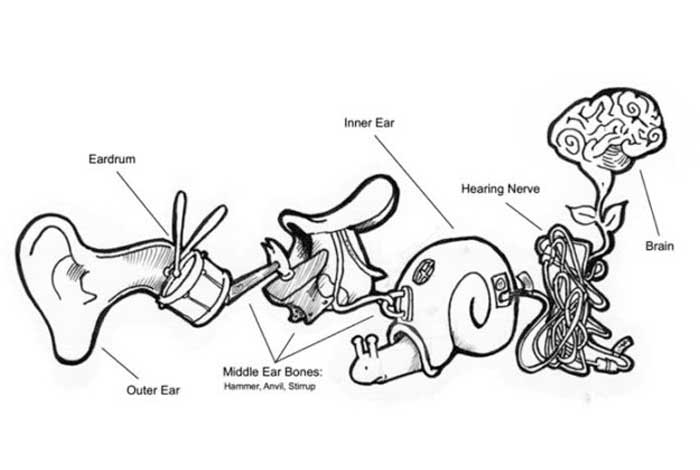
According to the statistics, about 20% of Americans that makes nearly 48 million people suffer from some degree of hearing loss. Also, the condition becomes more common after the age of 65 years and is found in 1 out of every 3 people. Moreover, nearly 15% of children in the U.S.A. aged between 6-19 years have also been found to suffer from some degree of hearing loss. [1]
Types and Symptoms of Hearing Loss
According to the cause of hearing loss, it can be classified into following types:
- Conductive hearing loss: It is caused when there is a blockage or damage in the ear drum, ear canal or middle ear and its bones, namely malleus, incus and stapes. This poses a hindrance to the proper conduction of sound from ear canal to the eardrum, or from the eardrum to the inner ear. It is more common in children and people of indigenous descent. Technologies and medical interventions are generally effective in managing this condition.
- Sensorineural hearing loss (SNHL): When there is a malfunction or damage to the inner ear hair cells, sensorineural hearing loss occurs. It generally leads to permanent hearing loss. The effects of sensorineural hearing loss can be reduced with the help of assistive technologies.
- Mixed hearing loss: It is a condition in which a combination of both conductive and sensorineural hearing loss occurs. The hearing loss occurring due to sensorineural component is permanent in nature whereas the conductive component can either be temporary or permanent.
- Auditory Neuropathy: When the auditory nerve transmitting sound from internal ear to brain get damaged, auditory neuropathy occurs. The hearing loss observed in this case can range from minor to severe, depending on the degree of damage done to the nerves.
Symptoms of Hearing Loss
Hearing loss is generally a rather gradual process and is not very obvious. However, it can also be sudden and can be either temporary or permanent. One of the most common symptoms of hearing loss is difficulty in deciphering speech. However, earache, spinning sensation (vertigo) and unusual noises in the ear (tinnitus) are some of the symptoms that are associated with hearing loss.
Some of the other symptoms of hearing loss are:
- Difficulty in understanding speech
- Asking people to repeat themselves
- Watching TV or listening to music at relatively higher volumes
- Talking over phone becomes difficult
- Keeping up with conversation becomes tiresome
- Concentrating more on listening than on speaking while talking to someone
These symptoms are generally mild in the initial stages but can become severe with time. Also, the symptoms of hearing loss might vary if a person has hearing loss in one ear, as they can use their other ear for hearing.
The symptoms of hearing loss in one ear are:
- Difficulty in determining the direction of sound
- Sounds seem to be lower than usual
- Difficulty in differentiating among different sounds
- Problem in understanding speech
- Speech seems unclear
- Difficulty in hearing when sound comes from one side
Generally, hearing loss in one ear occurs when the sound is temporarily unable to reach the inner ear due to several factors like clogging of ear canal by ear wax or ear infection.
Hearing loss in children is more difficult to diagnose than in adults. Moreover, if a child is suffering from hearing loss, the parents might not understand his symptoms and therefore treatment can be delayed.
Some of the general symptoms of hearing loss in children are:
- Slow in learning to talk or unable to talk properly
- Unable to listen to parents or not replying to what they say
- Loud talking
- Repetitively asking parents or other people to repeat while talking
- Listening to TV at higher volumes
Also, there are times when babies are born with this condition. Following are the symptoms of hearing loss in newborn babies:
- Not responding to loud noises
- Responding on seeing people but not when they are called
- Not responding to voices by the age of four months
- Not being able to say common words by the age of 15 months
Babies with hearing loss might respond to a few voices but not to all of them. Also, if parents observe any of these symptoms in their baby, they should visit a doctor so that treatment can be started at the earliest.
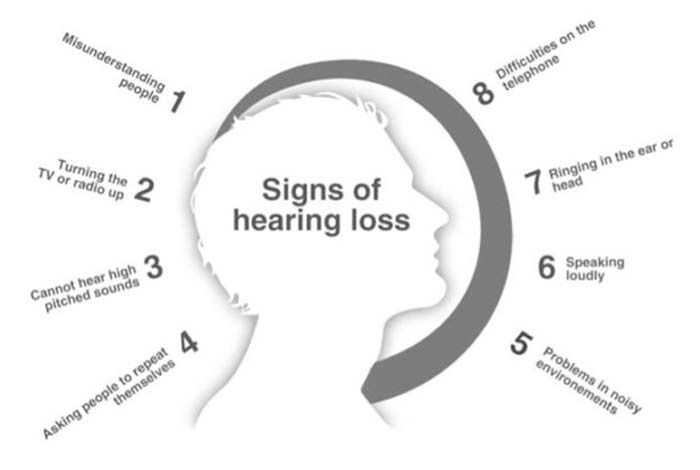
Risk Factors of Developing Hearing Loss
There are various factors that can increase the risk of hearing loss in people. Some of them are
Age
The internal structure of ear degenerates with time thus cause hearing problems and it is quite common for the elderly to develop hearing loss.
Genetics
The genes of a person can also make him lose his hearing capabilities if problems related to hearing run in the family.
Exposure to noises
Excessive exposure to loud noises can damage the inner ear and increase the risk of developing hearing loss. Long term exposure to loud noises like listening to music on high volume using earphones for a long time, or sudden loud noises like those of gunshot, or explosives can also damage the ear causing hearing problems. People who work in high noise environment like at construction sites, textile industries and foundries are at high risk of developing hearing loss.
Medications
Antibiotics like gentamicin and anticancer drugs can sometimes result in hearing loss as a side effect. Even high dose consumption of pain killers like aspirin, loop diuretics or antimalarial drugs can temporarily affect the sense of hearing and can result in ringing sound in ear, or can cause permanent hearing loss.
Diseases
Migraine is one such disease that can alter the hearing sensation of a person. Other diseases that can also increase the chances of developing hearing loss are atherosclerosis, autoimmune diseases, diabetes, tumors, Usher syndrome and osteosclerosis. Even the radiation therapy that is used for treating cancer, if used near the ear, can permanently damage the hearing ability.
Low Birth Weight
babies who are born pre-maturely and have low birth weight are at a higher risk of developing hearing loss than those who are born with normal weights. Decreased fetal growth is one of the reasons for resulting in hearing problems.
Injury
Brain and ear injuries can also result in hearing loss.

Do I Have Hearing Loss?
Hearing difficulties in adults is much easy to diagnose than in children. Parents can have a hard time in determining whether their child has a hearing disability because the child might not be able to communicate his problems effectively. If your child is showing any of the symptoms of hearing difficulty like not being able to follow instructions or is continuously asking to repeat the sentences or delays in speaking, consult a doctor immediately so that treatment can be initiated as soon as possible.
If you are an adult, then you can determine diminishing hearing abilities more easily. If you observe you are finding it difficult to follow other people’s speech or have trouble hearing in noisy environment or have difficulty while talking on phone, there might be a chance that you have hearing problem. If other members of the family complaint that you often miss the doorbell, or you listen to television or radio too loud, it might be time to visit a doctor soon. Also, if you find yourself saying’ What?’ a lot more than necessary and often ask people to repeat themselves, there is a high probability your hearing faculties are not working together. If you observe any of the above mentioned behavioral pattern, consult a doctor as soon as possible and get yourself checked.
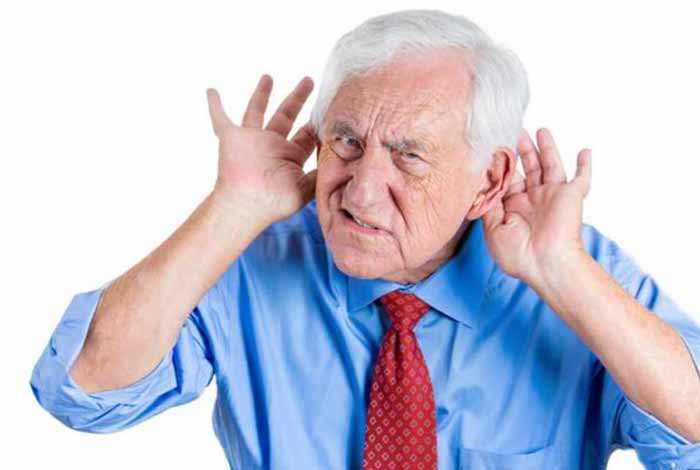
Causes and Prevention
Hearing loss can occur due to many reasons. Some of the reasons are listed below:
Hearing loss caused because of aging is common and is referred to as presbycusis. It is caused due to continuous changes in the inner ear with time. However, if the hearing loss is not age related, it is uncommon and there can be a number of causes which can be responsible for this kind of hearing loss.. Following are some of the causes of the different types of hearing loss:
- Causes of Conductive Hearing Loss:
- Obstructions in the ear canal caused from buildup of ear wax (cerumen), collection of clotted blood (hematoma), accumulation of fluid in middle ear from colds or blockage due to a cotton swab
- Damage to the ear drum caused by direct injury, middle-ear infection or due to a loud sound like in an explosion
- Dislocation of the bones of middle ear by a direct trauma
- Infection in the middle ear (otitis media) or infection in the ear canal (otitis externa)
- Retraction of the ear drum where eardrum moves towards the middle ear due to abnormal growth of skin in the middle section of the ear gives rise to a condition known as cholesteatoma. It is generally caused because of repetitive infections in the middle ear
- Malformation of outer ear, middle ear or ear canal structures.
- Allergies
- Benign tumors
- Osteosclerosis or abnormal bone growth near middle ear due to which the bones become intervened together to form one single mass that does not transmit sound properly.
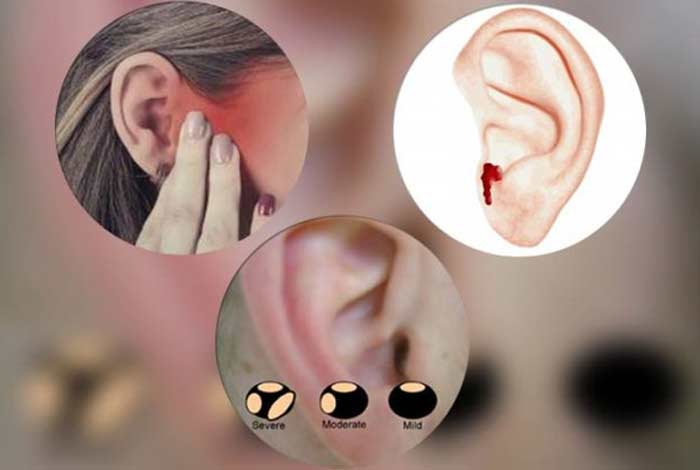
- Sensorineural Hearing Loss:
- Trauma, either long-term or direct, can inflict damage to the nerves that receive sound waves and transmit them to brain. Acoustic trauma, which is caused due to long term or sudden exposure to loud noises can weaken the hair cells of cochlea, thereby affecting hearing capacity. Also, head trauma resulting in damage to the temporal bone (located at the sides of the skull) can affect the cochlea and auditory nerves, causing hearing loss.
- Medicines that affect or damage auditory nerves are referred to as ototoxic drugs. High doses of these drugs can cause hearing loss and they include various antibiotics like aminoglycosides and minocycline, non-steroidal anti-inflammatory drugs (NSAIDs) like ibuprofen, naproxen and aspirin, diuretics like ethacrynic acid and furosemide, and anticancer drugs.
- Other health conditions like sickle cell anemia, diabetes, leukemia and multiple sclerosis can also result in hearing loss. Also, Meniere disease, a disease that affects the balance and hearing capability of a person can also be a possible cause of hearing loss. It can possibly cause weird ringing inside ears (tinnitus) and vertigo. Acoustic neuroma, i.e. a tumor at the auditory nerve, can also lead to hearing loss. Moreover, in people with kidney problems, auditory nerves can get affected, causing hearing problems.

The ability to hear sounds can be affected in new born babies due to infections like influenza, herpes, mumps, measles and meningitis in mother during pregnancy or at the time of birth.
However, it is possible to prevent hearing loss, by taking certain precautionary measures. Some of the measures which we can take to prevent hearing problems are:
- Do not listen to television, radio, or music at loud volumes as it can possibly cause internal damage to the ear and cause hearing loss. Using earphones or headphones for listening to music can inflict damage to the ears and cause hearing loss. Minimizing or avoiding the use of earphones/headphones can help in preventing hearing loss.
- If a person is regularly exposed to loud noises as a part of his occupation, ear protection devices like ear defenders can be used to protect his ear from damage. Also, musicians can use specially vented earplugs in order to protect their ears from excessive loud noises
- While attending music concerts, riding a snowmobile or shooting, it is advised to use safety devices to protect ears from the damage caused by the loud noises. Also, people should provide appropriate rest to their ears so that they can recover from the damage caused by loud noises.
- People should refrain from inserting alien objects like cotton buds, cotton swabs, tissue papers, or even fingers into their ears as these can damage the insides of the ear and result in hearing loss.
- People working in noisy environment should go for regular hearing tests in order to detect any changes in their hearing capability at an early stage which will prevent further damage of ear.
Diagnosis and Tests of Hearing Loss
There are various methods used for the diagnosis of hearing loss. Physical examination of the patient is the first thing that a doctor does to identify the reason of hearing problem. Doctors generally ask about the time around which the person started observing symptoms or how difficult is it for them to hear different sounds.
The doctor also examines the family history of the patient in order to determine whether the condition is genetic or not. The person is also asked if they are taking any medicines that might be causing hearing loss. Physical factors like ear wax accumulation or infection that might be causing a hearing loss are also evaluated.
For diagnosing hearing problem, the doctor might ask the person to cover one of his ear and try to listen with just one ear.
Besides, the doctor can recommend going for a checkup with an audiologist who can appropriately diagnose the condition and determine the intensity of hearing loss. Some of the common tests used by audiologists for determining the intensity of hearing loss are:
- Pure tone audiometry
In this test, the patient wears a headphone and a special band on their head, while sitting in a sound proof booth. The audiologist plays various sounds of different pitches and the patient has to identify them. The test results are recorded by the audiologist and examined later for diagnosis.
- Speech audiometry
It is a test that examines how clearly a person can distinguish among different words. The person is made to sit in a soundproof booth with headphones and the doctor makes him listen to different words at different volumes. The patient has to recognize the words and recite them.
- Trans tympanic electrocochleography (ECOG)
It involves examining the electric signals sent by the nerves of inner ear to the brain, when sound waves stimulate them. The audiologist makes the patient lie in a sound proof booth and puts a recording sensor in his ear. The recordings of the test are later examined by the audiologist to give the test results.
These tests help in determining the extent of hearing loss in a person and helps the audiologist in providing appropriate treatment for the condition.
Also, new born babies are screened for hearing capabilities before leaving the hospital after delivery. This is necessary to diagnose any hearing problem at the earliest for proper treatment. The tests used for determining hearing loss in babies are:
- Automated auditory brain response
It is a test that involves the use of soft earphones that are placed in the ears of the child, and sensors which are put on their head. The doctor plays soft tones to the child and records the response of their auditory nerves.
- Otoacoustic emissions
This test involves the use of a tiny probe that is placed inside the ear canal of a the new born baby. Later, the doctor plays soft sounds to the baby and the probe helps the doctor in determining the function of the outer hair cells of the ear.
Correct diagnosis at the right time can save a person or a child from losing his hearing abilities.
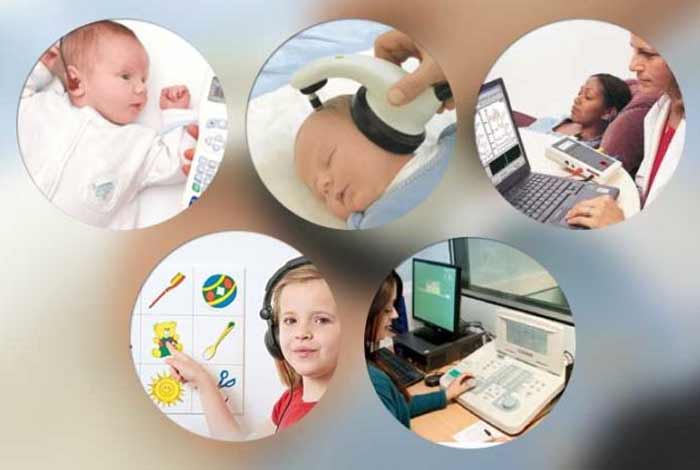
Treatment and Care
Treatment of hearing loss is generally dependent on its type. In case of conductive hearing loss that is caused by obstructions like ear wax or cotton swab in ear canal, the treatment is aimed at removing the obstruction to regain normal hearing abilities. Ear wax is removed from the ear by using special instruments that do not harm the inner walls of ear canal. In case the ear wax is very hard, doctors generally prescribe ear drops to soften the wax so as to remove it more easily.
If the cause of hearing loss is an infection, doctors generally prescribe antibiotics or anti-fungal medicines that can help in treating the infection. However, the medications are generally used when the infection is in the middle ear. If the infection is in the ear canal, the doctor might simply prescribe an ear drop for the treatment. However, if the infection is chronic or there is a tumor in the ear, surgical treatment might be needed to treat it.
If hearing loss arises due to malfunctioning of the ear canal because of structural malformation or congenital problem, it can be managed with the help of surgery. If surgery does not work, hearing aids can be used to improve hearing. There are mainly two types of hearing aids available in the market which help countless people who suffer from advanced hearing loss, these are;
1) Analog hearing aids
2) Digital hearing aids.
- Analog hearing aids work by converting the sound into electrical signals and increasing their loudness. They work in the similar way a microphone does when connected to an amplifier. They can be programmed according to the environment a person is in, like a big room or a small one.
- Digital hearing aids convert sound signals into numerical codes and again into sound. that are further converted into sound again. They can be programmed to amplify only those frequencies which the person has difficulty hearing. In this way, these devices give more flexibility.
These hearing aids are available in different models according to the comfort of the patient. These are:
- Behind-the-ear hearing aids that are used for treating hearing loss with severity varying from mild to rare. They are generally bigger in size and are very powerful. It generally comprises of a plastic case, which is put behind the ear and an ear mold that is put inside the outer ear.
- Open-fit hearing aids are worn behind the ear and the sound is transmitted inside the ear with the help of a narrow tube that is placed inside the ear canal. However, it is different from behind-the-ear hearing aids because it allows the ear canal to stay a bit more open. They are generally smaller in size and feel less plugged up as compared to the behind-the-ear hearing aids.
- In-the-ear hearing aids are very small in size and can easily fit inside the outer ear of a person. They contain a small magnetic coil, known as telecoil, that ease up the telephonic conversations. However, they are not used for small children as their outer ears are still in the growing phase.
- In-the-canal hearing aids are generally used for people who have mild to moderate hearing loss. They are smaller in size and can easily fit inside the ear while being barely visible. However, they are less powerful as compared to other hearing aids as they become difficult to remove because of their small size.
Before using any kind of hearing aid, it is advised to take the recommendations from an ENT (Ear, Nose and Throat) Specialist, as he can prescribe the most appropriate hearing aid required by the patient after analyzing their condition.
If hearing aids become ineffective, people need hearing implants for hearing. These are electronic devices that are surgically fitted inside the skull of a person. Some of the commonly used hearing implants are cochlear implants, bone anchored hearing aids (BAHA), middle ear implants and auditory brain stem implants.
- Cochlear implants are used when the hearing aids fail to work for the condition, while the auditory nerve is still working. Such a condition arises when there is a severe damage to the inner ear. Cochlear implants comprise of a microphone like device that collects sounds and converts it into electrical signals, that are transmitted directly to the brain through the auditory nerve.
- Bone-Anchored Hearing Aids (BAHA) are used when the sound cannot reach the inner ear. These implants go inside the bone behind the ear. They transmit sound directly to the inner ear through the skull.
- Middle-ear implants have a small device that is attached to one of the bones of middle ear which sends strong signals to the inner ear. It helps people who have sensorineural type of hearing loss. They have an advantage of being completely hidden and can be used even while swimming or bathing.
- Auditory brainstem implants are similar to cochlear implants. They collect sounds through a microphone like device and convert it into electrical signals. But unlike cochlear implants, these do not transmit signals to the cochlea. Instead the signals are directly transmitted to the brain. These implants are more effective as they can be used even if a person has a problem in his auditory nerves.
It is advised to go for hearing implants only after consulting it with an ENT specialist. A genetic condition known as otosclerosis can become a possible cause for hearing loss, in which bony fixation of stapes occurs. It can be treated by surgically replacing the malfunctioned stapes with a functioning one, to regain normal hearing.
In case of sensorineural hearing loss, the methods for the treatment are similar to that of conductive hearing loss. There are various situations that can cause sensorineural hearing loss, such as a trauma, air pressure fluctuations, Meniere’s disease, or some infection. However, these can be treated with the help of hearing implants or the use of doctor prescribed corticosteroids to treat the factors contributing to the condition.
Besides all the treatment methods, it is necessary to provide a lot of care to a person suffering from hearing loss, especially children.
If a child is suffering from mild hearing loss, parents have to patiently teach them the way they can focus on different sounds. Also, children suffering from mild hearing loss are generally slow at learning and ca not keep up with teachers like other children, thus it is important to educate the teaching staff of their school about their condition, so that they can co-operate with the child.
Moreover, children are usually not comfortable with using hearing devices and might also deny to use them altogether. Thus, it is necessary to guide them to wear the device and make them understand that it is only used for their own welfare.
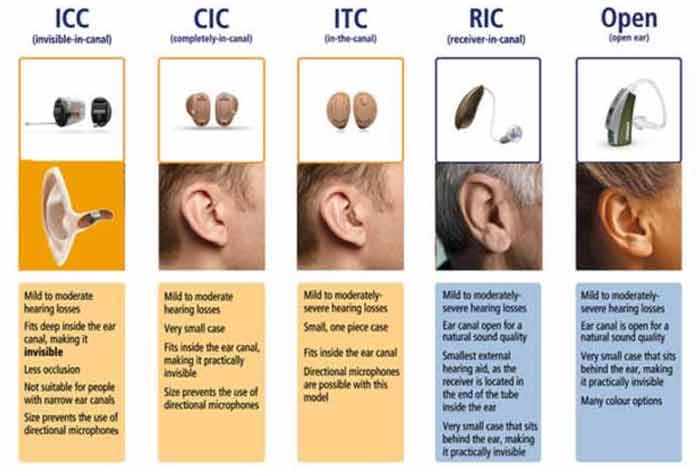
OTC and Self-Management Methods
There are no over-the-counter medicines that can be used for the treatment of the hearing loss. However, if the hearing difficulty is being caused due to hardened ear wax inside the ear which is obstructing the passage of sound, ear wax softening drugs like turpentine oil can be used.
People with mild hearing loss or are at risk of developing acute hearing loss with time so such , they should focus on preventive methods so that their condition does not become worse. They should not listen to loud music, or TV and radio at high volumes. They should also use some kind of ear safety equipment while going to loud places.
Moreover, they need to use their hearing devices regularly and should try to focus on the subjects while in a conversation with someone. They should not feel any kind of shame while asking people to repeat themselves. But, if a person has severe hearing loss or if they are deaf by birth, they can learn skills like lip reading and sign language that can help them in keep going with the life.
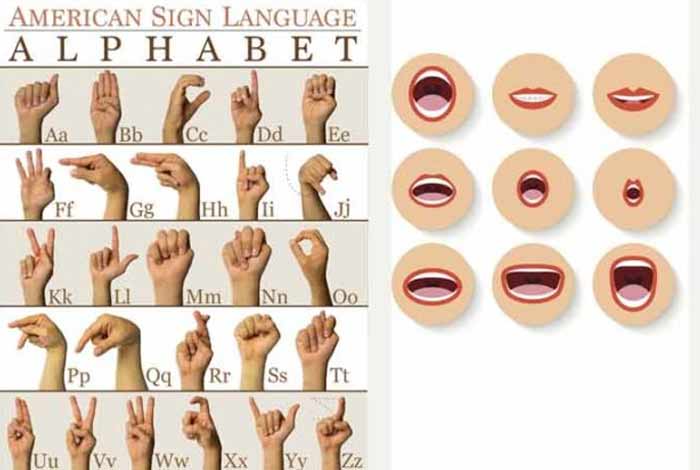
Natural Treatment
There are various natural treatment methods that can help in improving the hearing and sometimes even reverse the loss of hearing in people. If the hearing loss is caused because of damage to the auditory nerves of a person, the natural treatment methods are ineffective, however, if the cause of hearing loss is some infection or obstruction, these methods can cure hearing without spending a lot of money.
One of the best way to prevent/treat hearing loss is to keep the ears clean. Generally, ears get clogged up with ear wax, that obstructs the sound from reaching the inner ear and leads to hearing loss. However, if a person regularly cleans their ear and don’t let ear wax deposit, he or she can prevent/treat hearing loss.
Also, the natural treatment of hearing loss lies within the diet. Including various foods in the diet and avoiding some of them can help in treating hearing loss naturally. Avoiding foods such as processed meats and dairy products, foods that contain high amount of unsaturated fats, greasy or fried foods can help in preventing hearing loss. Moreover, including various foods such as organic meats, fish, soybeans, eggs, ginger and cinnamon bark can help in preventing hearing loss.

Health Tip by Experts
Hearing loss is a serious condition that can take away the bliss of hearing to the wonderful sounds of nature and the noises of your loved ones. However, with proper care and treatment, you can regain your ability to hear and regain the power to complaint about the noises of this planet.

